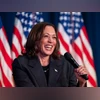By Gregory Korte
A panel of Democratic stalwarts will meet Wednesday to complete a rule change to allow Vice President Kamala Harris to accept her party’s nomination for president weeks in advance of the party’s convention in Chicago.
The virtual roll call would take place the first week of August and formalise the result of a remarkable 32-hour blitz in which Harris won the support of a majority of delegates without a single challenger emerging.
President Joe Biden threw his support behind the vice president shortly after announcing he would no longer seek the nomination despite winning 99 per cent of the pledged delegates to the convention, which begins on Aug. 19.
The idea of a virtual roll call emerged in May in order to make sure the Democratic ticket would have time to get on the ballot in several states with early filing deadlines, party leaders said. The convention’s rules committee meets to finalise that process Wednesday — the last remaining obstacle to holding the vote.
It was Ohio’s Aug. 7 deadline that prompted the rule change, and even though the state pushed it back to Sept. 1, it’s unclear whether the old deadline still applies to the 2024 election.
More From This Section
Washington State, California, Virginia, Montana and Oklahoma also have deadlines during the convention week. And though the deadlines are often waived, the Heritage Foundation, a conservative group that is working to influence policy in any future Trump administration, has said it is looking into legal options to challenge attempts to replace Biden with Harris on state ballots.
Any challenge to the Democratic ticket appearing on the ballot would be “at best a distraction and a delay,” said Dana Remus, a Covington & Burling lawyer who represents the party.
“We will not allow technicalities or MAGA extremists to disrupt the electoral process,” said Minyon Moore, the former White House political director under President Bill Clinton and the chairwoman of the convention.
The early nomination vote — which could take place as soon as Aug. 1 — will provide added urgency for Harris to select a running mate beforehand. While party leaders have not committed to a deadline for the vice presidential nomination, Ohio law requires the party to certify in writing the names of both the presidential and vice presidential candidates to appear on the ballot.
The decision underscores the evolution of nominating conventions, from the smoke-filled rooms of a century ago to the largely choreographed prime-time messaging platforms they’ve become today, with little suspense about the outcome.
There is precedent for a virtual roll call. As the coronavirus pandemic in 2020 disrupted the party’s plans for an in-person convention in Milwaukee, the party nominated Biden via a made-for-television roll call of the states that allowed each delegation to highlight local landmarks.
Democratic leaders say they’ll still have a ceremonial roll call at the Chicago convention the week of Aug. 19, and the delegates will vote in person on the party platform.

)